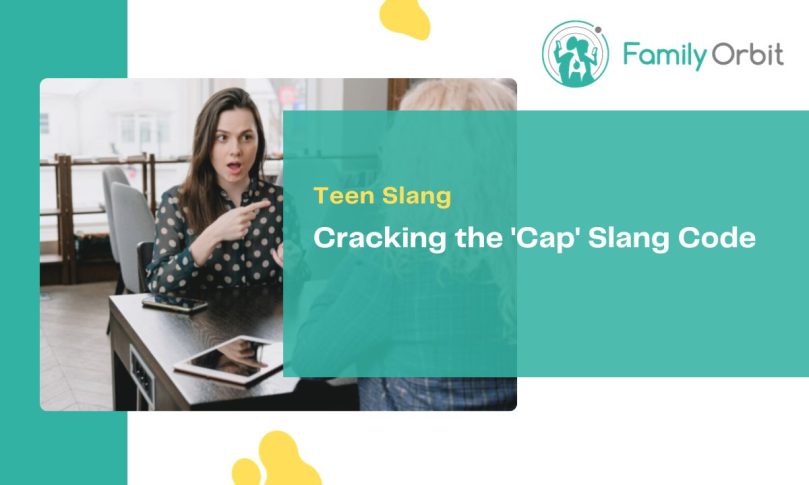Among the seemingly never-ending new list of words parents need to understand, “cap” is another linguistic gem that your teenage kids commonly use in their chats. But do you know exactly what this 3-letter expression means?
Here we will unravel the secrets of this popular slang and explore all its meanings. Also, we’ll shed some light on its origins and proper uses in different contexts. By the end, you’ll know all you need to know about the term “cap”.
Cracking the ‘Cap’ Slang Code: A Parent’s Guide
Cap in slang does not mean the usual head covering that you use to cover bottles or jars. Cap in American slang means lying or exaggerating. Now where adults may say “That’s a lie,” some teens would say “That’s cap”.
The word can function as a noun, verb, or adjective depending on the sentence structure. It is common to use the interjection “no” alongside “cap” as in “no cap”, which means no lie. Also, a capper is a lair as described by fellow teenagers in texts and social media posts.
The Intriguing World of ‘Cap’ Slang and Its Origins
The slang “cap” is primarily an American slang that has gained increased popularity, particularly with the spreading impact of Hip Hop music. It is believed to have originated in the early 1940s as a part of African-American Vernacular English. Ever since its emergence, this word has been synonymous with lying, bragging, or exaggerating.
However, it was in the year 2017 that the terms “cap” and “no cap” gained enormous popularity. This was to do with the surging rise of TikTok, the well-known short video platform.
Numerous rappers incorporated the term “cap” into their lyrics and achieved sensational success online. As a result, the word “cap” has become insanely popular and commonly used in online and offline conversations.
‘Cap’ in Action: Where Teens Slip It into Conversations
Teens incorporate slang such as “cap” into their online texts and chat smoothly in different contexts. Here are a few examples of how youngsters employ this popular slang in their online conversations:
No cap – Means honestly or truthfully. For example, a teen might say: “I am serious, no cap, the new episode of the series is amazing.”
Capping – This is often used to refer to a person who consistently lies or exaggerates. For instance, when a friend makes unrealistic or unbelievable claims, their friends might respond with: “Stop capping, we know what happened at the party.”
Busting caps – A phrase that teens use to describe a person who constantly shows off. For instance, if your kid describes a friend that they are always busting caps about their new watch.
Cap as an expression of endearment – While less common, this usage exists in certain contexts. For instance, your teen kid might say: “John is my favorite person, cap.” In this context, “cap” is used to emphasize their fondness and affection.
Context Matters: The Versatility of ‘Cap’ Slang

The popular slang “cap” is undoubtedly versatile and has evolved over the years. Throughout the years, this slang has gained the ability to express different meanings and sentiments. Initially, it was used to express truthfulness. However, it has evolved to be used in many situations.
For instance, it can refer to an exaggeration in a person’s claims or behaviors. Additionally, it is used to express confidence in a statement or even confirm endearment or fondness for a person. Such flexibility and versatility have made this slang adaptable and popular in modern chat languages.
Behind the Trend: Why Teens Embrace ‘Cap’
As with the majority of modern slang, teens love using them in their chats and social media posts. Such love for this slang is for a good reason:
It is an example of the shared language – Using common and popular slang emphasizes a sense of belonging to a bigger group. This way teens feel connected instead of feeling rejected and outsiders.
Adding a sense of creativity to chats – Teens are always on the lookout for cool and creative things. This allows them to stand out from older generations. Using slang like “cap” or “ no cap” adds an exciting flair to their communication.
Expressing different meanings – A single word like “cap” can express various meanings. So, it is only up to the context to give the word the correct meaning. Typically, a word with multi-meanings allows teens to show off their linguistic skills and adaptability.
Parental Clarity: Grasping the Meaning and Implications

It is not easy for you to keep up with modern chat slang, but it is important for better communication with your teen kids. In addition to improving communication, understanding modern slang helps protect your kids from improper slang usage online. Here are some useful tips for grasping the meaning and implications of “cap”:
Stay updated – This means educating yourself about modern chat acronyms and slang. You can do this by looking new words up in the urban dictionary. Also, check out our website for many more definitions of popular terms.
Be open – To effectively bridge any communication gap between you and your teen kids, you should be open and communicative. By engaging in open conversations with your kids, you will gain proper insight into the correct usage of “cap” as slang.
Go online – Staying online is effective in enlightening you about online slang. This allows you to watch various influencers’ videos, where slang is consistently used. Also, you get to observe actual conversations, where teens and their peers are constantly expressing their language.
Educating yourself about modern slang allows you to use it naturally and smoothly. This helps in better communication and open conversations within the family.
So, it is important to approach this topic with an open mind, respect, and understanding of the intentions and contexts behind these terms. Remember, slang is not a bad thing. It is a part of language evolution and the cultural impact that youngsters can have on language.
Tech Tools for Parents: Staying Informed and Engaged
It is normal for you to keep track of your kids’ online interactions and conversations. It gives you peace of mind knowing the context of slang your kids use and the influence it has on their ideas and behavior.
You can’t do this by searching their phones without permission or monitoring their online interactions 24/7. Things can be much simpler if you use an efficient parental control app.
Parental control apps keep you alert if your kids are exposed to offensive or harmful online content. You can also stay informed of their accurate locations. Also, these apps give you control over determining your kids’ screen time and the websites they can access.
But keep in mind that no app can substitute for open and direct communication with your kids. So, ongoing discussions with your teens about online safety and the context of slang should be a top priority.
- Monitor Calls & Text Messages
- View Photos and Videos
- Location Tracking & Geofence
- Monitor WhatsApp & Kik
- Detect & Alert for Inappropriate Activities
- Monitor Websites Visited
- Compatible with Android and iOS
- ASL Meaning in Text: Unveiling the Significance of ‘ASL’ Slang
- 200+ Teen Slang Terms Decoded for Parents: Unlocking the Teen Lexicon
- Unmasking the “Sneaky Link”: Decoding the Modern Teen Trend
- What Does BTW Mean: A Parent’s Guide
- SSDD Meaning: The Startling Teen Slang Parents Should Know About Now!
- Rizz Meaning Unveiled: A Guide for Parents of Young Teens
- WTH Meaning in Text: Deciphering Teen Slang

